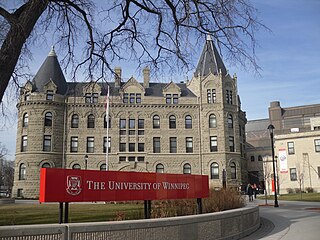
Winnipeg is the capital and largest city of the province of Manitoba in Canada. It is centred on the confluence of the Red and Assiniboine rivers, near the longitudinal centre of North America. As of 2021, Winnipeg had a city population of 749,607 and a metropolitan population of 834,678, making it the sixth-largest city, and eighth-largest metropolitan area in Canada.

Filipino Canadians are Canadians of Filipino descent. Filipino Canadians are the fourth largest subgroup of the overseas Filipinos and one of the fastest-growing groups in Canada.
Winnipeg Arena was an indoor arena located in the Polo Park district of Winnipeg, Manitoba, Canada.

Canad Inns Stadium was a multipurpose stadium in Winnipeg, Manitoba, Canada.

Joy Ann Smith is a Canadian politician. She served in the Legislative Assembly of Manitoba between 1999 and 2003, and was in the House of Commons of Canada from 2004 to 2015.
Current laws passed by the Parliament of Canada in 2014 make it illegal to purchase or advertise sexual services and illegal to live on the material benefits from sex work. The law officially enacted criminal penalties for "Purchasing sexual services and communicating in any place for that purpose."
Human trafficking in Canada is prohibited by law, and is considered a criminal offence whether it occurs entirely within Canada or involves the "transporting of persons across Canadian borders. Public Safety Canada (PSC) defines human trafficking as "the recruitment, transportation, harbouring and/or exercising control, direction or influence over the movements of a person in order to exploit that person, typically through sexual exploitation or forced labour. It is often described as a modern form of slavery."

Paying for It, "a comic strip memoir about being a john", is a 2011 graphic novel by Canadian cartoonist Chester Brown. A combination of memoir and polemic, the book explores Brown's decision to give up on romantic love and to take up the life of a "john" by frequenting prostitutes. The book, published by Drawn & Quarterly, was controversial, and a bestseller.

She Has a Name is a play about human trafficking written by Andrew Kooman in 2009 as a single act and expanded to full length in 2010. It is about the trafficking of children into sexual slavery and was inspired by the deaths of 54 people in the Ranong human-trafficking incident. Kooman had previously published literature, but this was his first full-length play. The stage premiere of She Has a Name was directed by Stephen Waldschmidt in Calgary, Alberta in February 2011. From May to October 2012, She Has a Name toured across Canada. In conjunction with the tour, A Better World raised money to help women and children who had been trafficked in Thailand as part of the country's prostitution industry. The first performances of She Has a Name in the United States took place in Folsom, California in 2014 under the direction of Emma Eldridge, who was a 23-year-old college student at the time.
Ratanak International is a Christian charity founded by Brian McConaghy in 1989 that works exclusively in Cambodia helping the country rebuild after decades of revolution, civil war and genocide. Ratanak, which means 'precious gem' in Khmer, was an 11-month-old Cambodian baby that Brian McConaghy watched die as a result of a basic lack of medicine in a documentary he was shown in 1989. Since 1990 Ratanak has been working in Cambodia to help prevent such needless deaths. To help rebuild Cambodian society which the Khmer Rouge effectively dismantled in the 1970s, Ratanak has partnered on projects that have built schools, clinics and hospitals, opened orphanages, provided shelters for the elderly and AIDS victims, and initiated emergency programs in response to natural and man made disasters. In 2004, these projects plus many more continued, but the work of Ratanak also took on a whole new dimension as it begin partnering on projects that rescue, rehabilitate and reintegrate children sold into sexual slavery.

ACT Alberta is a Canadian coalition of Government of Alberta representatives, non-governmental organizations, community organisations, and the Royal Canadian Mounted Police. ACT Alberta provides resources to help front-line workers identify potential trafficking situations and aid victims of human trafficking. The coalition also raises awareness of human trafficking in Alberta.
The Office to Combat Trafficking in Persons (OCTIP) is a government agency responsible for coordinating efforts to address human trafficking in British Columbia, Canada. The focus of OCTIP's mandate is human rights, specifically those of the victims of human trafficking. OCTIP formed in 2007, making British Columbia the first province of Canada to address human trafficking in a formal manner. In 2008, the United States Department of State released a report on human trafficking in Canada that was generally critical of the Government of Canada for failing to address the issue, but the report praised the efforts of the Executive Council of British Columbia, specifically citing their creation of OCTIP. In June 2011, OCTIP launched a training program to certify first responders to identify, protect, and assist victims of human trafficking in the province. The program cost $106,000; half of the funding came from OCTIP while the rest was covered by Public Safety Canada and the Department of Justice. The following month, the Executive Council of British Columbia cut the annual budget for OCTIP from $500000 down to $300000, got rid of the executive director position, and reduced the number of full-time staff to two. Robin Pike was the executive director before her position was eliminated. Her last day of work was July 29. Between 2007 and 2011, OCTIP serviced more than 100 human trafficking victims in British Columbia.
Jessica Edith Louise Foster, is a Canadian woman who disappeared in the Las Vegas Valley in Nevada, United States, in 2006. Her parents are Glendene Grant and Dwight Foster. Jessie Foster had spent some time living in Calgary, Alberta. In 2005, Foster and a friend of hers visited Florida together, and then stopped by Las Vegas on the way back in May where Foster decided to stay. Before disappearing the following year, Foster became involved in prostitution, was arrested once for solicitation, and was the victim of battery on several occasions.
North Preston's Finest, also known as NPF, the Scotians, or the North Preston gang, is a gang of pimps based in North Preston, a satellite of Dartmouth, Nova Scotia, Canada.

Tara Teng is a Canadian former pageant winner. She was named Miss Canada in 2011 and Miss World Canada in 2012. During her title reigns she was an advocate for human rights and spoke about human trafficking.

The National Action Plan to Combat Human Trafficking is a four-year action plan that was established by the Government of Canada on June 6, 2012 to oppose human trafficking in Canada. In 2004, the government's Interdepartmental Working Group on Trafficking in Persons was mandated to create a national anti-human-trafficking plan, but the mandate went unfulfilled despite reminders from politicians and non-governmental organizations (NGOs). Member of Parliament (MP) Joy Smith put forward motion C-153 in February 2007 to put a plan in place, and the House of Commons passed it unanimously. Smith began developing a proposal and released it in September 2010 under the title "Connecting the Dots". University of British Columbia law professor Benjamin Perrin helped guide Smith's writing of the proposal. Before the establishment of the NAP-CHT, a variety of people and organizations—including the 2009 and 2010 Trafficking in Persons (TIP) Reports of the United States Department of State—criticized Canada for failing to have such a plan.

Natasha Falle is a Canadian professor at Humber College in Toronto, Ontario, Canada, who was forcibly prostituted from the ages of 15 to 27 and now opposes prostitution in Canada. Falle grew up in a middle-class home and, when her parents divorced, her new single-parent home became unsafe, and Falle ran away from home. At the age of 15, Falle became involved in the sex industry in Calgary, Alberta.
Timea Nagy is a Canadian activist who has spoken on behalf of victims of human trafficking. She founded Walk With Me, a Toronto-based organization that aids survivors of trafficking. Nagy was featured in an anti-trafficking campaign by the Salvation Army in 2009. Her activism has drawn upon her own experience of forced prostitution in Canada.

Benjamin Perrin is a professor at the Peter A. Allard School of Law at the University of British Columbia. He lives in Vancouver, British Columbia, Canada.










